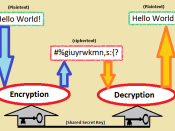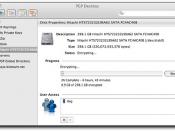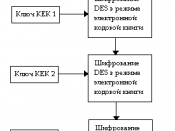In a recent on-line survey, 93 percent of those surveyed voted that the internet needs more security (Appendix A). In the rapidly growing world of internet users, many users are afraid of 'on-line' thieves, commonly called hackers or crackers. Most of these users are inexperienced, or lack the knowledge to protect themselves, while the hackers are extremely experienced. It is very easy for a hacker with a plain-text, which is non-encoded bits of information traveling through the internet, viewer to get a person's name, password, credit-card information, and other valuable information (Weiss 54). Many hackers can 'infect' a user's computer with a virus, which is a damaging program, without the user even knowing. Internet crime is rising, but there are ways to reduce the threat. These facts are some of the reasons that the internet needs to be more secure ... but the real question that evades many users, servers, and system operators; also
known as SysOps, is how?
The most popular survey answer is encryption; eighty-nine percent, an overwhelming majority (Appendix A).
Encryption is a 'code' of numbers and letters used to mask the text sent across the internet. For instance a simple code is to replace each letter with its corresponding number, A = 1, B = 2, etc. For a novice cracker this code is challenging, but an expert can crack it very easily (Weiss 71). A challenging code is basically random and almost impossible to crack:
'For example, take a look at this 'before' shot of a line of text:
Hi! I'm a line of 'plaintext' which means that this text is plain.
Then we use our miracle encryption system (only $19.95!) - and
now, look at the 'after' shot:
hEwctbdGE386fBAgCQc9uN+0LoCi ...
Impressive, I hope you agree.' (Weiss 72)
The most popular and best encryption,


